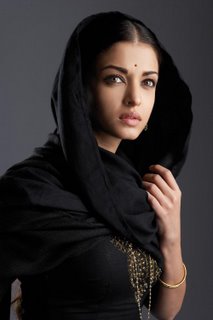
The 18th of November. The day to experience musical bliss - the date of release of the music of 'Guru', the latest Mani Ratnam offering with A R Rahman as the music director. The combination of Ratnam and Rahman has, of course, produced musical masterpieces of the finest quality in the past, not least irresistible of which was 'Dil Se' and the magical 'Chaiyya Chaiyya' number. Add to that the fact that I simply LOVE anything and everything created by Rahman, and you'd get a fairly good idea of how excited I was for the 18th of November to arrive.
Arrive it did, and after a lot of frantic hunting and searching I finally got my hands on the seven prized tracks of the movie. And though I was pretty confident that I would not be disappointed with the jackpot, considering Rahman's outstanding tendency to repeatedly come up with stunning music, after hearing the songs my first reaction was - 'Better than Rang De Basanti. Now don't get me wrong, I am actually very fond of RDB's music, but I always felt that the focus of Rahman's efforts in RDB was to make songs that suited the movie and carried the story forward. They did do that brilliantly, but the niggling feeling that the music of the movie in its individual sense wasn't of the very high quality that is expected of Rahman in a big movie such as RDB never quite left me. With Guru, however, it is a different story altogether. Perhaps it's the Mani Ratnam influence at work, but Rahman crafts a thoroughly assured album this time, with all the versatility and unpredictability that has become so expected of his music.
'Tere Bina' and 'Aye Hairathe' are two wonderfully similar and wonderfully soothing numbers, and have a distinctive sufi style to them, a brand of music that Rahman had perfected so long ago in 'Taal' and 'Fiza'. 'Barso Re', on the other hand, is a very boisterous track that is sung brilliantly by the extremely talented Shreya Ghosal, and I need hardly mention that this is a winner of a track too. 'Mayya Mayya', sung by a singer with a singularly Arabian feel to her voice (I forget the name of the singer-Rahman does have a very irritating habit of pickng up completely unknown and unheard of singers from nowhere) is very well-composed for the most part but loses steam (and a little rhythm too) towards the end. Somehow, the Gujarati elements interspersed among the heavily Arabian flavour present throughout the song don't strike the right chord.
'Jaage Hain' is a very slow, soft track that will seemingly create a greater impact when heard during the movie. The two situational tracks in the album, however, stick out horribly, but this is no real shock because Rahman does have a tendency to range from the supremely sublime to the intolerably trashy, even within a single album. 'Ek Lo Ek Muft', in particular, is very probably one of his worst songs ever, and Bappi Lahiri's vocals do nothing whatsoever to induce any liking for the song. It just sounds bad, period. 'Baazi Laga', meanwhile, is quite an insipid composition, and hardly compares with the 'Chori Pe Chori' track from Saathiya from which it draws inspiration. However, the rest of the tracks in the album are so exceptionally good that the two shoddy numbers can hardly make a dent in the impact created by the album. And the impact, it must be said, is very very strong-I can say without hesitation that this is one of Rahman's finer albums, and is definitely better than the previous collaboration between Ratnam and Rahman, Yuva.
What is it that makes Rahman click, over and over again? His incandescent genius has been on show for nearly fifteen years in Bollywood now, and perhaps much longer in the South. And yet, he manages to surprise you with a remarkable new sound nearly every single time he creates an album. Perhaps his greatest skill is the amazing ease with which he transcends the boundaries of Bollywood to come up with truly global music that at the same time gels wonderfully well with Indian movies and sensibilities. And his music hasn't always been of the arty kind that only appeals to the intellectual elite. Indeed, he is one of the few musicians who have been able to effortlessly glide between the classical and the blockbuster and whet the appetite of the classes as well as the masses with astounding aplomb. Some of the music he has created, like for instance Taal or Lagaan is so striking that it leaves you wondering why and how he is still employing his phenomenal gifts in a place as loud and trashy as Bollywood. Quite frankly, I don't think Bollywood deserves an extraordinary genuis like A R Rahman.
No comments:
Post a Comment